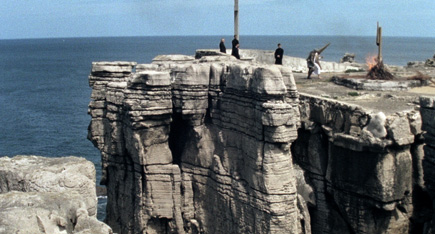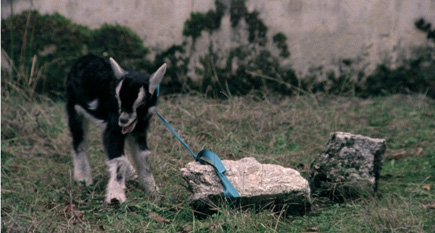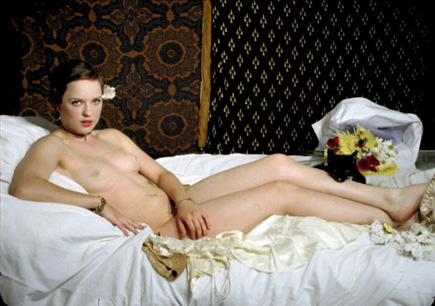Liberdade, Palácios de Pena and Olympia I & II will show at BFI London Film Festival this weekend.
More info here: http://markwebber.org.uk/experimenta/
From the outset, Gabriel Abrantes & Daniel Schmidt’s Palácios de Pena establishes for itself a sense of veiled purpose, effecting a curious disjuncture in both narrative and form. Sumptuously, meticulously photographed; cinematic; yet curiously at odds with its conventional mantle, it dances between feature film and long-form artist’s work, never quite allowing itself to be pinned by either trope.
The film’s protagonists, a group of teenage girls, maintain a louche, cool, strangely distant relationship with one another, and with the narrative itself, somehow at once within and beyond the world which is constructed for us – for them – as if reluctant to submit entirely to the fiction. The effect of distanciation that this produces, whether intentional or merely an artefact of the artists wielding the tools of the feature film director (that is, at something of a remove himself), or of the loss of a layer of linguistic codes in translation and subtitling, is one of an ‘othering’: as with the actresses themselves, the dialogue is aware of itself, and becomes to an extent self-reflexive, its words ‘othered’. It is almost as if the girls are speaking lines from another film. Their words fall heavy.
Providing the framework for this sparse dialogue, in the film’s opening scene, is a richly symbolic space; a large, empty sports stadium. It is an arena for spectatorship, for contest, for competition. The girls navigate the space at first, it seems, without any of the usual components of a game we might expect to see in such a stadium. Ball, racquets, sticks, crowd are absent, and the girls instead run and dive together, awkwardly denuded of the bald accroutements of sport – those instruments which would complete the loop of meaning suggested by the stadium location – playful yet aggressive, strangely balletic. And the film’s other spaces, as they appear, are similarly symbolic: a high concrete enclosure, a dam, a stone tower, a rock escarpment overlooking the sea.
The interdeterminacy of space, it seems, is a theme that Abrantes & Schmidt use throughout the film – the withholding of meaning; the free interchange of signification – to great effect, given (indeed, because of) the conventional format he has chosen. Where we might expect to see closed sets of meanings presented within a taut, linear narrative, the artists play, presenting a multiplicity of meanings, momentarily, before closing the loop.
Framed entirely by women, aside, surely pointedly, from a dream about men, and the errors of men, in the cast of amoral ‘chorus’, troubled moral individual, wild seer, and sage-like figure (‘Little Grandma’, the dreamer) presiding over all, Palácios de Pena follows a fabulous (in the strict sense of the word) narrative which recalls – not only, ineluctably, for their association with Portugal, for thefado drifting across the frame – the magic realism of Eugène Green’s A Portuguese Nun or John Berger’s Here is Where we Meet; also the utopian spaces of Tarkovsky; the cruelty of Haneke. It examines a similar liminality: of the space between wakefulness and sleep, reality and dream, morality and amorality, life and death. It is no surprise, perhaps, that its main protagonists are teenagers, navigating that dangerous time between the amoral and moral, child and adult: a time for and of cruelty. It lives in the interval, in the black space, at death itself, perhaps. But it exists on its own, too, in a state of magical suspension.
Beyond the draw of its narrative, though, Palácios de Pena – indeed Abrantes’ other work – is interesting in the context of the recuperation of narrative in artists’ moving image after the ascetic purges of Structuralism. Its very length, too, at an hour, consigns it to an indeterminate, uneasy category – something almost subversive for a work with so ostensibly straightforward a method.
It is emblematic, perhaps, of a new fluidity in artists’ moving image practice and, beyond the recuperation of narrative, which is after all well-established, suggests – as Ben Rivers and certain others move towards longer-form work – a challenge to the commercial, conventional form of feature film itself which goes beyond the assimilative strategies of Steve McQueen, Gillian Wearing and others. That is, it demands to use those most conventional of the tropes of commercial feature film yet remain outside of the (arguably decayed) industrial model of production and mainstream distribution network.
Adam Pugh
Palácios de Pena will be screened alongside two other collaborative works by Abrantes.
GABRIEL ABRANTES screenings :-
Saturday 22 October 2011, at 9pm, BFI Southbank NFT3
Tuesday 25 October 2011, at 1:15pm, BFI Southbank NFT2
By Gabriel Abrantes and Katie Widlowski
Gabriel Abrantes early film Olympia I & II will follow the screening of two ambitious new works – Liberdade and Palacios de Pena – in his solo programme on 22 & 25 October. The artist will be present to introduce and take questions on these works, which were made in collaboration with Katie Widlowski, Benjamin Crotty and Daniel Schmidt.
To accompany two new films by Gabriel Abrantes, Olympia I & II (2008) is revisited to delve deeper into the way this artists treats his characters’ attitudes towards sex, sexuality and power. Abrantes and Katie Widlowski explicitly reference Manet’s painting Olympia (1863) through the title and the visual composition of the frame. Their use of 16mm film heightens the painterly qualities of the work: the saturated colours, the grainy make-up, the smoothness of the porcelain skin of Olympia and the velvet cushions and feathery flowers caressing her body.
Despite the art historical context, the work does not get lost in aesthetics. The twisted and verbally aggressive interaction of Olympia I contrasts with the sickly sweet homoerotic conversation that leads to intercourse between transvestite Olympia and his maid in Olympia II. Both films evoke the characters’ sadness and bitterness towards life and their psychological cracks hit the viewer emotionally.
Marina Ribera
Palacios de Pena (Palaces of Pity) received its world premiere at the Venice Film Festival 2011. Here’s the trailer :-
GABRIEL ABRANTES screenings :-
Saturday 22 October 2011, at 9pm, BFI Southbank NFT3
Tuesday 25 October 2011, at 1:15pm, BFI Southbank NFT2






No comments:
Post a Comment